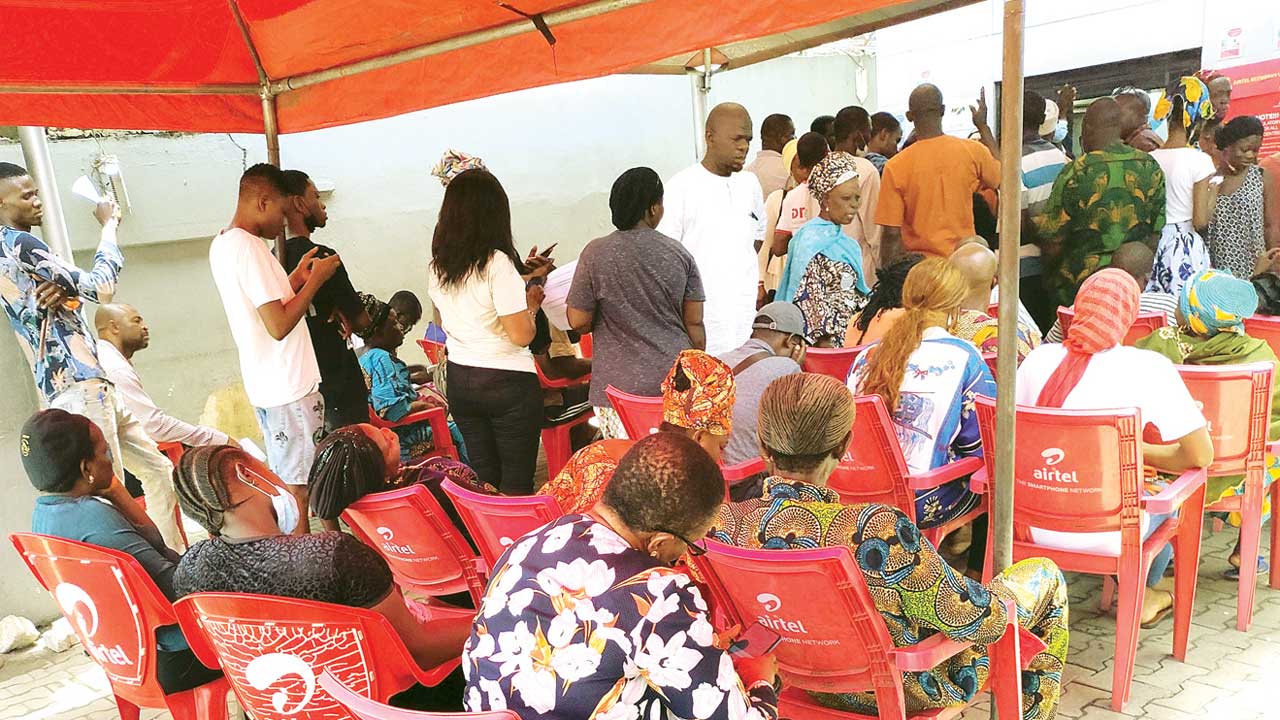
• Challenge may worsen poverty, financial inclusion
• Businesses suffer, transactions halted as SIM linkage issues persist
• Millions of verified telephone lines remain barred
• Overstretched facilities slow backend integration, compound woes
• FG blames delay in passport issuance on breakdown of NIMC server
While the reported server crisis/downtime suffered by the National Identity Management Commission (NIMC) a few weeks ago might have been resolved, it has created a new challenge in the financial inclusion ecosystem, both for businesses and individuals.
The Guardian can reveal that the crisis has also invalidated some linked National Identification Numbers (NINs), necessitating another round of visits to the Commission’s offices and telecoms help desks located nationwide.
For those unfortunate to have their phones stolen or have challenges with their Subscriber Identification Modules (SIM) cards, they are in for another round of extortion and stress, just as many businesses with already-linked lines have been barred from telecommunications service for no fault of theirs.
At the weekend, the Federal Government attributed the delay in issuance of international passports to the rare but sudden breakdown of the NIMC server. Minister of Interior, Ogbeni Abdulrauf Aregbesola, disclosed that the breakdown of the NIMC server has made validation of passport applicants’ biodata impossible, adding that discrepancies in names of citizens on their passports and NIN also add to the problem.
“We are not the ones holding your passports and preventing you from travelling. The problem is the inability to link your biodata with your NIN. That is beyond our control. Why could this be? The server of NIMC might be down, it rarely happens, but it does happen.
“Another problem is the applications themselves. Individuals shouldn’t be bearing different names on their NIN and passports. It won’t be a seamless integration. There shouldn’t be a mix up of middle names in place of first names and vice versa, as it is on your NIMC, so it should appear on your passport. These little things conspire against speedy processing of passports,” Aregbesola said.
The Guardian checks showed that many of the subscribers that besiege service centres of telecommunication firms in areas visited in Lagos have similar complaints – invalidated NINs. And they have been cut off from telecommunication services, undermining government’s efforts at improving telephony and financial inclusion.
Small businesses in rural areas too have not been spared, as they complain that their telephone lines have been barred, with some having completed both linkage and verification of the NIN-SIM process.
Recall that mandatory use of NIN was approved by the Federal Government and came into effect on January 1, 2019, with ample time for Nigerians to get their NINs, but as typical of human nature, some waited till the last moment, necessitating several extension of deadline.
The process was, however, compounded in December 2020, when the Federal Government insisted that Nigerians must link their NINs to their SIMs for security purposes. The process created another round of challenges for those without NINs as they were required to visit designated centres for the NIN-SIM exercise to avoid disconnections.
Painfully, after about eight deadline extensions, the Federal Government ordered telecoms operators to bar outgoing calls on non-linked lines. This has exposed many Nigerians to fresh registration challenges.
Over 20 days, since April 5, when the enforcement came into effect, the impact has been negative on businesses, especially Small and Medium scale Enterprises (SMEs), which rely largely on their mobile for transactions but were caught in the web.
More worrisome is that some of the affected business owners claimed to have completed the linkage and verification exercise and had subsequently got confirmation notices from their network operators long before government’s directive.
As at April 6, close to 75 million telephone lines were barred by the quartet of MTN, Globacom, Airtel and 9mobile from making calls.
Those who claimed to have got success notifications of completed linkage, but had been barred, are finding it extremely difficult to unbar their lines when they follow the links provided by telecoms operators.
The Guardian gathered at the weekend that the situation is worse in rural areas, as more businesses, which rely on mobile, are gradually on the verge of collapsing because of the directive.
Shola Aiyela, an electrician based in Ogbomosho, Oyo State, said he followed the directive to link his SIMs to NIN and got confirmation that the linkage was successful, “only for me on April 10 to discover that I cannot call out. I use both Glo and MTN lines. The two lines were barred. I have tried to re-link the lines as directed but nothing has changed. The telcos offices are jam-packed! They have told me to come back this new week because all through last week, they had no network. They claimed not being able to verify the NIN from the portal of NIMC.”
Matthew Kayode, an auto mechanic claimed that he had linked all his three telephone lines to his NIN and had got confirmation too of a successful linkage, “only for me to want to make calls since last week, I was told the numbers have been barred. Since then, I have been visiting telecoms outlets, the complaints have been no network. Now, I cannot call people for business.”
Nnamdi Okoro, Abia-based tiler, said since his line was barred from making calls due to the inability to link his NIN to his SIM, keeping in touch with customers has been difficult.
“There are more than five customers who should bring work for me this week but I have not called them because my line is barred,” Okoro lamented. “Even when some try to call and I miss their calls, I can’t call them back.”
Betting store operator, Gbenga Adewale, is also feeling the impact. Some of his active customers usually don’t visit his office in Alapere, Ketu, Lagos. Instead, he calls customers to receive instructions on games and stake amounts. It’s now almost three weeks since his line was barred, and his revenue has taken a plunge.
AT telecoms operators’ offices in parts of Lagos, it is a sad tale as affected people lament the process of unbarring their lines. Some claimed to have been coming to some of the centres for about a week without results because of network failures.
The same goes for NIMC offices at Alausa and other designated centres, the challenge of no network continues to frustrate subscribers.
Though the quartet of MTN, Globacom, Airtel and 9mobile have respectively sent out links that can assist affected subscribers to get their SIMs linked, there is yet no respite for their subscribers.
For instance, affected MTN subscribers can either visit their offices or submit NIN by dialing *785*NIN#; Airtel is *121*1# and 9mobile is *200*8#. To submit NIN to Glo, subscribers are expected to send SMS: UPDATENIN, NIN Firstname Lastname to 109.
Subscribers, who spoke with The Guardian, lamented that these links are either too slow or not connecting at all, thereby aggravating their pains. Some said they had to visit the outlets, where they are extorted as well.
Speaking on the matter, yesterday, the chairman, Association of Licensed Telecoms Operators of Nigeria (ALTON), Gbenga Adebayo, urged affected subscribers to exercise patience, stressing that the challenges were not from telecoms operators.
Adebayo explained that operators collect NINs and subsequently send them across to NIMC for verification. He said until NIMC confirms and returns the NINs, that is when confirmation is guaranteed and linkage done.
“I will appeal to affected subscribers to exercise some patience. Operators usually wait for NIMC to confirm and verify collected NINs after they have sent those received to the NIMC backend. The slow confirmations are usually from the backend of NIMC. So, when subscribers are not getting responses two or three days after registration, the challenge is from NIMC, they need to exercise patience. The Commission must first confirm before the affected lines can be unbarred,” he stated.
Already, the Nigerian Communications Commission (NCC) has informed telecoms consumers, whose SIM cards are barred from making calls that affected SIMs will not be unbarred by the service providers until they are linked with the NINs of the SIM holders.
An industry source told The Guardian that the challenge may persist till the end of the second quarter because of so many factors.
“There are huge capacity gaps at NIMC; lack of funds to replace obsolete equipment is another major factor and the challenge they had in February when they claimed that a sister agency, which handles the Commission’s hosting service had a technical problem, is yet to be completely resolved. So, all these are the major factors causing delays in verifying NINs sent to them, especially from telcos,” he said.
Some economists, who spoke with African Business, noted that the cumulative impact of so many small businesses being cut off from their customers could be substantial. An economist and Senior Advisor at RTC Advisory, a Lagos-based business advisory firm, Omolola Lipede, said small businesses, especially those in rural areas with poor roads and sporadic internet connections, will be hurt.
“Some of the businesses are just recovering from the impact of COVID-19. Not being able to connect with their customers will affect them badly. Small businesses contribute at least 48 per cent of national GDP and account for 96 per cent of businesses and 84 per cent of employment. If these businesses are affected, the ripple effect on people across the country and the economy will not go unnoticed,” Lipede stated.
According to him, the telcos are also losing revenue from barred customers, which will impact on tax revenues.
Managing Partner of Empyrean Professional Services, a Lagos-based accountancy and tax firm, Emmanuel Bamgboye, said the long-term gains could outweigh immediate losses, but only if a better system for linking NINs to SIMs is implemented.
“What is happening is a reflection of the state of the nation. I don’t think they are ready… and the impact on businesses will be enormous. Instead of making a simple voice call, some people may resort to travelling distances to carry out business transactions.
“It will put more load on infrastructure and will slow down economic activities, which we are already seeing,” Bamgboye stressed.






